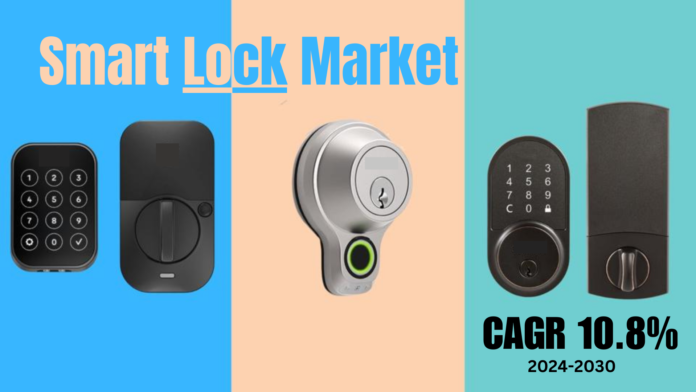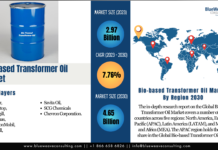Smart Lock Market is flourishing due to the rising awareness and adoption of smart home technologies driven by an increasing level of disposable income and rapid urbanization.
BlueWeave Consulting, a leading strategic consulting and market research firm, in its recent study, estimated the Global Smart Lock Market size at USD 2.43 billion in 2023. During the forecast period between 2024 and 2030, BlueWeave expects the Global Smart Lock Market size to expand at a CAGR of 10.79% reaching a value of USD 4.98 billion by 2030. The Global Smart Lock Market is propelled by the growing adoption of advanced technologies, such as the Internet of Things (IoT), Artificial Intelligence (AI), and Machine Learning (ML). Notably, the increased consumer awareness about the benefits and security features of smart door locks is a contributing factor to the market expansion. The complexity and high efficiency of these locks have led to their deployment in various locations, strengthening overall security measures. Also, the increasing global adoption of smart home technology, coupled with the presence of companies specializing in home automation, contributes to the heightened demand for smart locks. The market players are dedicated to delivering commercially viable products and advancing solutions, including features like remote locking and opening of doors and windows. Concurrently, the expanding prevalence of homes equipped with voice assistants has led manufacturers to integrate their products with such devices, facilitating voice-controlled lock operations. These innovations are poised to boost the popularity of smart door locks with cameras, meeting the rising demand for sophisticated locking and unlocking systems. The market is also expected to grow as there is a heightened necessity to secure diverse properties such as individual residences, hotels, supermarkets, banks, financial institutions, corporate structures, smart lockers, and commercial buildings with advanced security solutions.
Opportunities – Implementation of technological advancements in smart locks
The Global Smart Lock Market has undergone a paradigm shift with the introduction of groundbreaking technologies, revolutionizing security and access control. A notable advancement is the integration of biometric authentication, employing fingerprint and facial recognition for secure and convenient access without traditional keys or PINs, enhancing user experience. Moreover, the rise in the adoption of artificial intelligence (AI) and machine learning (ML) has endowed smart locks with heightened intelligence and adaptability. AI-powered smart locks analyze user behavior, detect anomalies, and proactively enhance security measures, triggering alerts or temporary lockouts against potential threats. This technological evolution extends to mobile-based access, IoT integration, and blockchain security, ushering in a new era of sophisticated and user-friendly smart lock solutions, positioning the Global Smart Lock Market for continuous growth and innovations in the coming years.
Impact of Geopolitical Tensions on Global Smart Lock Market
Intensifying and spreading geopolitical tensions across regions impact the Global Smart Lock Market. As major countries, such as United States and China, engage in diplomatic conflicts and trade disputes, the growth of Smart Lock Market faces a number of challenges. As geopolitical tensions disrupt the global supply chain, they affect the timely procurement of essential components and raw materials. Tariffs and trade barriers imposed by countries further complicate the issue. Consequently, it leads to increased production costs. It, in turn, can limit the demand for smart lock technologies in various markets. In addition, uncertainties, caused by escalating geopolitical tensions, significantly affect consumer behavior. They affect investments in advanced technologies, including smart locks. Concerns over cybersecurity are more evident during geopolitical uncertainties. Governments and regulatory authorities increase scrutiny of technology imports, impacting the international flow of smart lock products. It could also lead to stringent regulations, forcing manufacturers to comply with stricter rules. The impact of escalating geopolitical tensions on the Global Smart Lock Market is manifold, affecting global supply chain, consumer behavior, investments, and regulations.
Sample Request @ https://www.blueweaveconsulting.com/report/smart-lock-market/report-sample
Global Smart Lock Market
Segmental Information
Global Smart Lock Market – By Application
On the basis of application, the Global Smart Lock Market is divided into Residential, Hospitality, Enterprise, and Critical Infrastructure segments. The residential segment holds the highest market share and is expected to maintain its dominance over the forecast period. It is primarily due to the global proliferation of smart home technology and the upswing in new construction and renovation projects across the sector in recent years. The increased affordability of contemporary security solutions, encompassing motion detectors, door and window opening sensors, fingerprint door locks, and remote door locking and unlocking, is anticipated to further propel the adoption of smart locks. A noteworthy trend is the development of locks compatible with technologies like Z-Wave, ZigBee, and BLE, particularly in the mass-market residential sector, attracting a diverse and broad client base.
Global Smart Lock Market – By Region
The in-depth research report on the Global Smart Lock Market covers the market in a number of major countries across five regions: North America, Europe, Asia Pacific, Latin America, and Middle East and Africa. North America holds the highest market share and is expected to maintain its dominance over the forecast period. It can be attributed to the increasing demand for smart locks in both commercial and residential sectors, particularly in major countries like the United States and Canada. The significant presence of large-scale manufacturers in the region is expected to further augment the overall market size. Furthermore, the widespread adoption of smartphones and iPhones in countries like the United States has translated into a substantial surge in the demand for smart locks. Notably, over 11 million households in the United States have already embraced smart locks, underscoring the awareness and recognition of the benefits offered by advanced security features in smart locks.
Competitive Landscape
The Global Smart Lock Market is fragmented, with numerous players serving the market. The key players dominating the Global Smart Lock Market include August Home, Inc., Avent Security, Cansec Systems Ltd, HavenLock, Inc., Schlage, Zigbang Co., Ltd, Smart Locking Logic Proprietary Limited, UniKey Technologies, Inc., MUL-T-Lock Technologies Ltd, and Goji. The key marketing strategies adopted by the players are facility expansion, product diversification, alliances, collaborations, partnerships, and acquisitions to expand their customer reach and gain a competitive edge in the overall market.
The report’s in-depth analysis provides information about growth potential, upcoming trends, and the Global Smart Lock Market statistics. It also highlights the factors driving forecasts of total market size. The report promises to provide recent technology trends in the Global Smart Lock Market along with industry insights to help decision-makers make sound strategic decisions. Furthermore, the report also analyses the growth drivers, challenges, and competitive dynamics of the market.
Contact Us:
BlueWeave Research Blog
Phone No: +1 866 658 6826
Email: info@blueweaveconsulting.com














